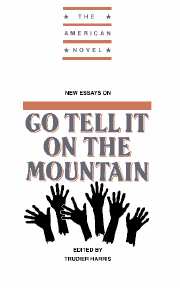Book contents
- Frontmatter
- Contents
- Series Editor's Preface
- 1 Introduction
- 2 A Glimpse of the Hidden God: Dialectical Visions in Baldwin's Go Tell It on the Mountain
- 3 The South in Go Tell It on the Mountain: Baldwin's Personal Confrontation
- 4 Wrestling with “The Love That Dare Not Speak Its Name”: John, Elisha, and the “Master”
- 5 Ambivalent Narratives, Fragmented Selves: Performative Identities and the Mutability of Roles in James Baldwin's Go Tell It on the Mountain
- 6 Baldwin, Communitas, and the Black Masculinist Tradition
- Notes on Contributors
- Selected Bibliography
4 - Wrestling with “The Love That Dare Not Speak Its Name”: John, Elisha, and the “Master”
Published online by Cambridge University Press: 05 June 2012
- Frontmatter
- Contents
- Series Editor's Preface
- 1 Introduction
- 2 A Glimpse of the Hidden God: Dialectical Visions in Baldwin's Go Tell It on the Mountain
- 3 The South in Go Tell It on the Mountain: Baldwin's Personal Confrontation
- 4 Wrestling with “The Love That Dare Not Speak Its Name”: John, Elisha, and the “Master”
- 5 Ambivalent Narratives, Fragmented Selves: Performative Identities and the Mutability of Roles in James Baldwin's Go Tell It on the Mountain
- 6 Baldwin, Communitas, and the Black Masculinist Tradition
- Notes on Contributors
- Selected Bibliography
Summary
Early in Go Tell It on the Mountain, when John's mother says, “The Lord'll reveal to you in His own good time everything He wants you to know,” we are told that “he had heard her say this before – it was her text.” John, however, has yet to discover what his text is. He ultimately embraces scripture, but the novel as a whole has as much invested in Henry James's tradition as it does in the Bible. I have argued elsewhere that Giovanni's Room (1956) makes homosexual desire explicit in James by revising “The Beast in the Jungle” (1902). In Go Tell It on the Mountain, the situation is reversed. James, in effect, silences Baldwin.
By the turn of the century, James had the reputation of being an exacting literary craftsman. His most avid supporters, among them Hendrik Andersen, Jocelyn Persse, and Hugh Walpole, proclaimed him the “Master.” What began as private obeisance has become a widespread critical convention, one that perpetuates the problematic and generally unchallenged assumption that James is a writer who rightfully commands unquestioning loyalty from all who read him. Accorded the canonical status of a sovereign, he oversees a vast literary dominion. That Baldwin, who greatly admired him, wrestled with his authority at crucial points throughout his career, is the underlying premise of this essay. Indeed, the troubled nature of his discipleship, or his indenture, is particularly evident in his first novel. For what James refuses to say Baldwin will not say either. On the authority of the “Master,” in other words, homosexuality must go unspoken. And yet its very namelessness is its name.
- Type
- Chapter
- Information
- New Essays on Go Tell It on the Mountain , pp. 77 - 96Publisher: Cambridge University PressPrint publication year: 1996
- 1
- Cited by



